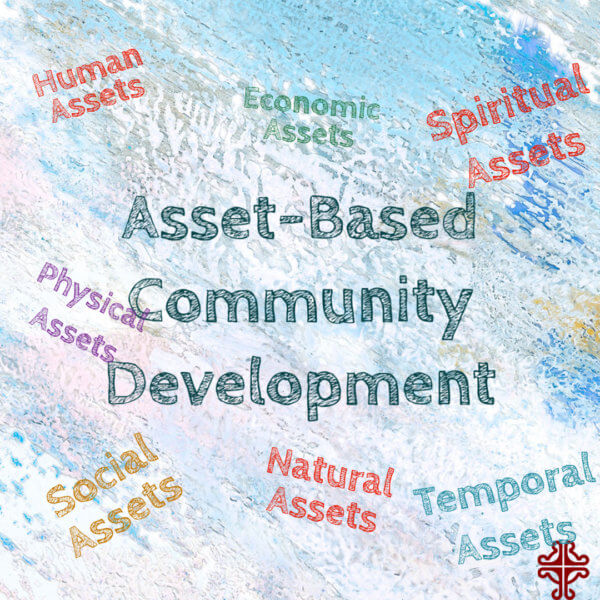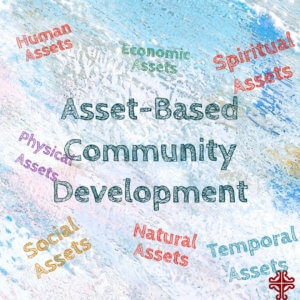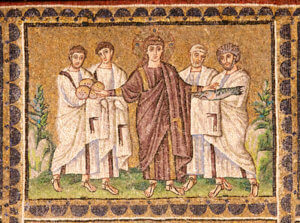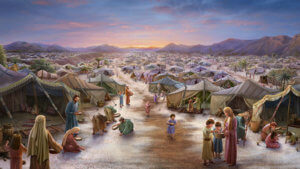
The ABCD’s of God’s Economy
 One of the most influential parts of my formation as a priest was my training in asset-based community development — often referred to as ABCD. My experience in ABCD really started with my 30 years of law practice. I worked with local governments and nonprofit corporations helping them enter into contracts with each other, and issue bonds to finance their public projects — water and sewerage systems, gas and electric distribution systems, electric generation systems, long-term natural gas supplies, schools, hospitals and landfills.
One of the most influential parts of my formation as a priest was my training in asset-based community development — often referred to as ABCD. My experience in ABCD really started with my 30 years of law practice. I worked with local governments and nonprofit corporations helping them enter into contracts with each other, and issue bonds to finance their public projects — water and sewerage systems, gas and electric distribution systems, electric generation systems, long-term natural gas supplies, schools, hospitals and landfills.
This was business done a different way, where savings from the efficiencies of local governments working together did not go to banks and stockholders, but instead went directly to the people. As I often used to say to the bond rating agencies, the profits returned to Main Street, not Wall Street. But even though public finance was business done a different way, it still mapped onto a traditional business paradigm. Nonprofits and communities issued bonds to get money — to build or repair what they needed. I learned about asset based community development — called ABCD — later when I started doing global mission work through our church, All Saints’ Atlanta, in 2005. I later trained in ABCD at the Anglican Alliance in London during divinity school, and learned about its foundation in creativity, gratitude, and faith in God.
ABCD was different from traditional mission work of the 19th and 20th centuries, where well-intended Christians from North America and Western Europe took money resources and “know-how” into the mission field, teaching others how to be like us, and do things our way.
Relationship and Listening
ABCD was about relationship, and listening. ABCD was about being ready to learn, and not assuming we were there to show others how to do things. ABCD was about gratitude, creativity, and God. ABCD was as different from traditional mission work as public finance was from business as usual. It was based on gratitude for what we already have, and then using what we have to get what we need.
 I did my first hands on ABCD work in the Diocese of Western Tanganyika in northwestern Tanzania, near Lake Tanganyika. The first ABCD meetings in any community are grounded in Bible study. The reading I used most often was today’s gospel — the miracle of the feeding of 5,000 people from five barley loaves and two fishes, followed by Jesus’ teaching about the miracle. Remember in John’s gospel, a large crowd has started following Jesus all around the villages on the Sea of Galilee as he goes from place to place, healing the sick and restoring people to community when they’ve been set apart by disease, mental illness, ethnic or religious discrimination or other social isolation.
I did my first hands on ABCD work in the Diocese of Western Tanganyika in northwestern Tanzania, near Lake Tanganyika. The first ABCD meetings in any community are grounded in Bible study. The reading I used most often was today’s gospel — the miracle of the feeding of 5,000 people from five barley loaves and two fishes, followed by Jesus’ teaching about the miracle. Remember in John’s gospel, a large crowd has started following Jesus all around the villages on the Sea of Galilee as he goes from place to place, healing the sick and restoring people to community when they’ve been set apart by disease, mental illness, ethnic or religious discrimination or other social isolation.
Jesus sees the crowd, and puts his plan in action, starting a conversation with Philip. Where are we going to buy bread for all these people to eat?, Jesus asks.
Philip looks out over the crowd. Imagine how he must have been feeling! Wait, what’s this we stuff, Jesus?! Does that mean I should do something about it??? Philip’s eyes must have just about popped out of his head as he looked at that hungry crowd!
This is not a business proposition he can get his mind around — Six months’ wages would not buy enough bread for each of them to get even a little piece, Philip says to Jesus. Had Jesus counted up those people? Was Jesus confused and tired after a long day in the hot Galilean sun, reflected off the sparkling water of the Sea? Was Jesus taking him for a ride? Then Andrew, Simon Peter’s brother, tells Jesus that there is a boy in the crowd who has five barley loaves and two fish.
By this point, Andrew is running a predictive supply and consumption model. He wonders, What are five loaves of bread and two fish among so many people?” Well, you know the rest of the story.
God’s Economy
Jesus sits the 5,000 people down on the grassy field, takes the bread and fish, blesses it, breaks and shares it with the whole crowd. Everyone eats their fill, and when they’ve had a gracious plenty, as Jere’s southern family says, the disciples gather up the leftovers — 12 baskets full! Now this is a business model that utterly confounds the disciples!
The story is just a little different in Mark’s gospel. The disciples tell Jesus that he should send the crowd home, because it’s getting dark, the crowd is hungry, and there’s nowhere around for them to eat. No, Jesus says. You feed them. The disciples ask Jesus if they’re supposed to go into town and spend 6 months’ wages to buy food for the crowd. No, Jesus says again. Go and see what you have. They come up with five loaves of bread and two fish among them.
The bottom line is the same: there’s always enough when we bring our gifts before God.
Is this business as usual? Absolutely not! God’s economy is based on a different model than the disciples — or we — know from our experience in the world, even as experienced business people. God’s economy is based on abundance, not scarcity. God’s economy is based on generosity, not hoarding or detailed cost and reimbursement accounting.
And here’s something more: God’s economy is based on small currency. Sometimes the humblest gifts, like the the widow’s mite, are the most valuable.
You don’t have to be rich, and you don’t have to be a Roman citizen or an elected leader.
You can be a boy with five barley loaves and two fish.
You just have to bring your gifts before God and share them.
God’s economy is based on gratitude for what we have together, rather than disappointment for what we lack but think we need. In God’s economy, the most humble gifts are enough to share with everyone, because in God’s economy, nothing is wasted.
 We heard about God’s abundant economy described in our reading from Exodus, and in today’s psalm we said together, when God provided enough for the wandering Israelites — our ancestors in the faith — after they were freed from the bondage of slavery in Egypt:
We heard about God’s abundant economy described in our reading from Exodus, and in today’s psalm we said together, when God provided enough for the wandering Israelites — our ancestors in the faith — after they were freed from the bondage of slavery in Egypt:
God rained down manna upon them to eat
and gave them grain from heaven.
So mortals ate the bread of angels;
God provided for them food enough.
Remember God is clear with Moses and the Israelites about this manna from heaven. He tells them to gather only what they need to eat for one day, and not to hoard it, build stockpiles, or trade it on the secondary market. God tells the Israelites plain as day that God’s economy is not business as usual.
Some of the Israelites don’t listen and gather more than they need, thinking that God’s business advice is naive or foolhardy. But they find that the manna spoils and crumbles. God is serious about this one.
What Abundance Looks Like
Jesus explains God’s economy to the crowd just as plainly in today’s gospel. The day after 5,000 people dined like royalty on five loaves and two fish, the crowd is hungry again. They look around and see that Jesus and the disciples have moved on, so, they all pile into boats and head to Capernaum to find Jesus.
Now let’s stop there and imagine that picture for a moment. The Sea of Galilee is a freshwater lake about 60 miles around, so 5,000 people in boats that might at most hold 10 people apiece is its own story of abundance. God is trying to get us to think about what abundance looks like with this picture.
The people find Jesus and ask him, Rabbi, when did you come here? Jesus answers them, Very truly, I tell you. Now you know that “Very truly, I tell you” is Gospel Greek for LISTEN UP GUYS! I REALLY MEAN THIS.
Jesus says, very truly I tell you! You are looking for me now, not because you saw and understood the new economy I showed you by feeding the whole lot of you with 5 loaves and two fish, but because you ate your fill of the loaves. Do not work for the food that perishes, but for the food that endures for eternal life, which the Son of Man will give you.
Some of the 5,000 must have gone to business school, because now they’re ready to write a case study. What must we do to perform the works of God?, they ask. Maybe there’s an outline they can buy — The Works of God for Beginners, or The ABCs of ABCD. Jesus answers that believing in Jesus, and following Jesus’ example, is the work of God. Jesus tells them, I am the bread of life. Whoever comes to me will never be hungry, and whoever believes in me will never be thirsty.
How do we participate in God’s economy at Emmanuel? How do we find this bread of life? The Newport Music Festival issued a press release Thursday, announcing its new home, and its first ever season of year-round programming, at Emmanuel Church. To the Newport Music Festival, we say Welcome Home! We look forward to thriving in our shared mission of lifting up the human spirit.
Is our relationship a standard business deal, like a commercial lease? Absolutely not! God’s involved. Our collaboration is an ABCD deal in God’s economy, where relationships are based on gratitude, and nothing — nothing at all — is wasted.
Both we and the Music Festival had a tough time in COVID. Our budget was short. We had to close the preschool, and we had many costs. The Music Festival couldn’t have its summer season last year. But that’s what we didn’t have.
What did we have?
The Music Festival had an office condo in Middletown, patrons who love history and music, and connections all over the world.
Emmanuel Church had our beautiful, historical, acoustically resonant building, ideally suited to both concert performance and community space.
We also had our love and commitment to the church building, and to our worshiping community, where every day we model and enact Christian community in all that we do, and in all the ways we interact with others. The key to our mutual success is trust, good faith, and our eagerness to each bring our very best to the collaboration.
But this is important: we are not running a business. What we do is much bigger, much deeper, and much, much more satisfying and worthwhile: we are trying to live in the kingdom of God. In business, we often hear it said that the devil is in the details, meaning that we must diligence each provision of our work to protect our interests, and make sure we’re not getting bested in the business deal.
Very truly, I say to you: In God’s economy, God is in the details.
When we bring our gifts to God, there is always enough. Amen
